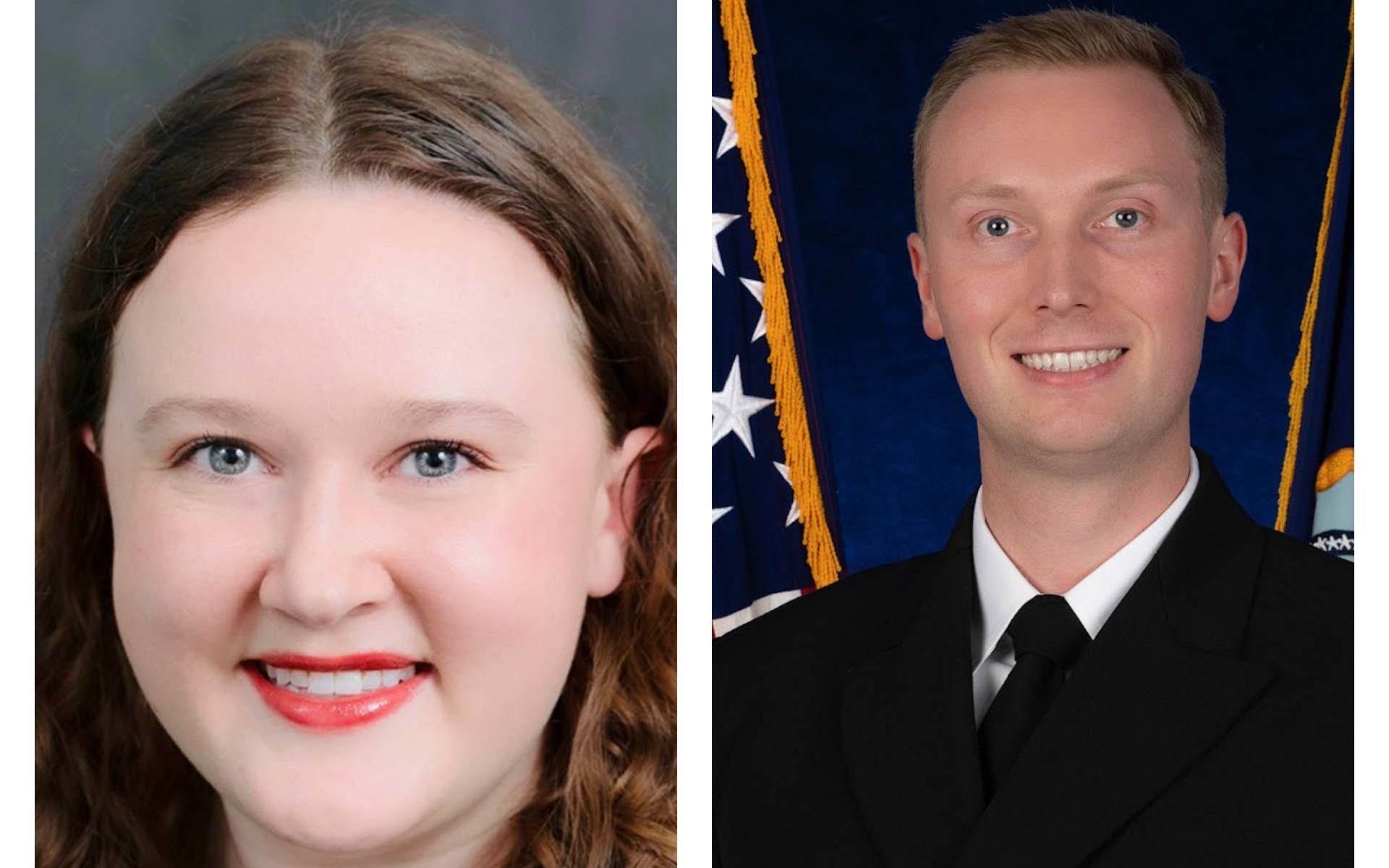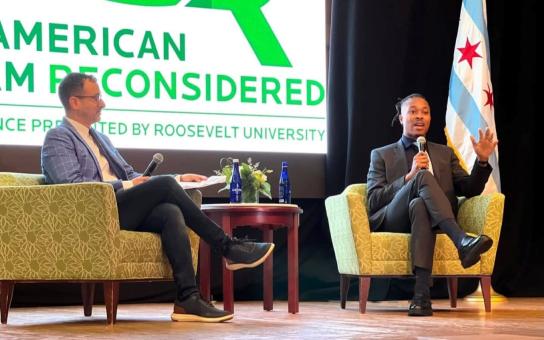
This August, Roosevelt will host its Commencement ceremony for the Doctorate in Clinical Psychology program. For the class of 2024, their 5 year-long journeys will culminate in a special celebration that highlights their accomplishments and forthcoming career aspirations. This PsyD cohort nominated two of their peers to deliver remarks at the ceremony: Maggie Collins and Timothy Fellin.
Maggie Collins grew up in the suburbs of Milwaukee before attending Indiana University in Bloomington. There, she pursued her bachelor of arts in Psychology, with emphasis in clinical science and counseling. Collins knew since high school that she wanted to explore psychology as a career path. “I realized I wanted a career that would align with my values while tapping into the things I love about life. I view human connection, growth-mindedness, social justice, and emotional vulnerability as highly important. I get to work in interdisciplinary teams, help others, and think creatively, all in the pursuit of life-long learning.” Her decision to attend Roosevelt, she says, felt natural. “I really appreciated their emphasis on social justice, and how Roosevelt embodies that in terms of the way they think about research and clinical experiences.” During her time in the PsyD program, Collins’ interests evolved to include the intersection of trauma recovery, trauma-informed health psychology, and sexual health. She specifically mentions professors like Dr. Jill Coleman, Dr. Steven Meyers, Dr. Matthew Skinta, and Dr. Yue Li as being instrumental in the development of her areas of interests and grasp of the field. Collins says:
“My dissertation chair, Dr. Coleman, is such a spectacular human being. She helped me work through my research in a way that felt accessible. Dr. Meyers helped me secure part-time work with the teaching fellowships for undergraduate psychology courses. His dedication to teaching has been inspiring and extremely helpful. Dr. Skinta was hugely influential to me as a student, with a wealth of knowledge about gender/sexuality research and practice. He also really inspired me to explore Acceptance and Commitment Therapy (ACT), which I utilize a lot with clients. And Dr. Li completely restructured my understanding of multicultural psychology curriculum. I thought it was really spectacular how she held space for important discussions around privilege, oppression, and identity, in a way that helped with the merging of the clinical with the socio-political.”
Collins also wanted to express gratitude for all of the faculty and staff members who were instrumental to her time at Roosevelt. Upon graduation, Maggie Collins is currently living in Madison, Wisconsin, where she matched at the University of Wisconsin School of Medicine’s Department of Psychiatry. She recently completed her year-long internship, and will soon continue on to her post-doctoral fellowship with emphasis in sexual health. Collins endeavors to become a clinical psychologist, certified sex therapist, and thanks to her time at Roosevelt, also has a passion for teaching and advocacy. She also reflects fondly upon the members of her cohort. “I love my cohort so much! We have such a special bond, that just thinking about it now makes me emotional.” She continues, “They have taught me so much, and each of them inspires me a lot, because all have very different interests. We are constantly learning from each other, and have become a little community.”
Another member of this community, and fellow commencement speaker, Timothy Fellin, also remarked on the diversity of the program. He says, “learning about diverse perspectives and interacting with diverse individuals, has especially challenged me to grow in a number of ways.” Originally from Oregon, Fellin completed his undergraduate degrees at Regis University in Denver, Colorado. He obtained two bachelor’s degrees, one in Neuroscience and another in Psychology. Knowing that he was interested in the assessment and treatment of neurological disorders, Fellin chose to embark on a journey of advanced education. As he was researching graduate programs, Roosevelt piqued his interest, being a top institution for his studies. Conversations with faculty solidified his decision to make the move to Chicago. Fellin’s initial interest was in neuropsychology, but through his clinical practicum opportunities, those interests have expanded to include complex trauma, substance abuse treatment, and military healthcare. He credits professor Dr. Steve Kvaal in helping bring focus to his interests. According to Fellin, “Dr. Kvaal was a foundational and inspiring professor, for not just challenging us academically, but for getting us to reflect on the significance of why we chose this career path.” Fellin also acknowledged Dr. Jessica Paxton, who, “was a huge support not only as my dissertation chair, but with career guidance and professional contacts she offered.” Another professor instrumental to Fellin’s success was Dr. Susan Torres-Harding, who, “always offered warm and insightful advice, especially during challenging and stressful times.” Today, Fellin is completing his internship with the US Navy as part of the Health Professionals Scholarship Program. While he is currently stationed in Norfolk, Virginia, he’ll soon be on his way to Charleston, South Carolina, where he will be functioning as a clinical psychologist at a training school for active duty servicemembers. Of his time at Roosevelt, Fellin says, “the foundation of my Roosevelt education instilled the importance of holding space and grace for all people of diverse backgrounds and perspectives. Coming away from my time at the university, a cornerstone of my education has been to prioritize the role of humanity in my clinical work.”
Maggie Collins and Tim Fellin both came to Roosevelt with academic ambitions to study psychology. Today, they are both on track to achieve their career goals, with more clarity and focus than ever before.


